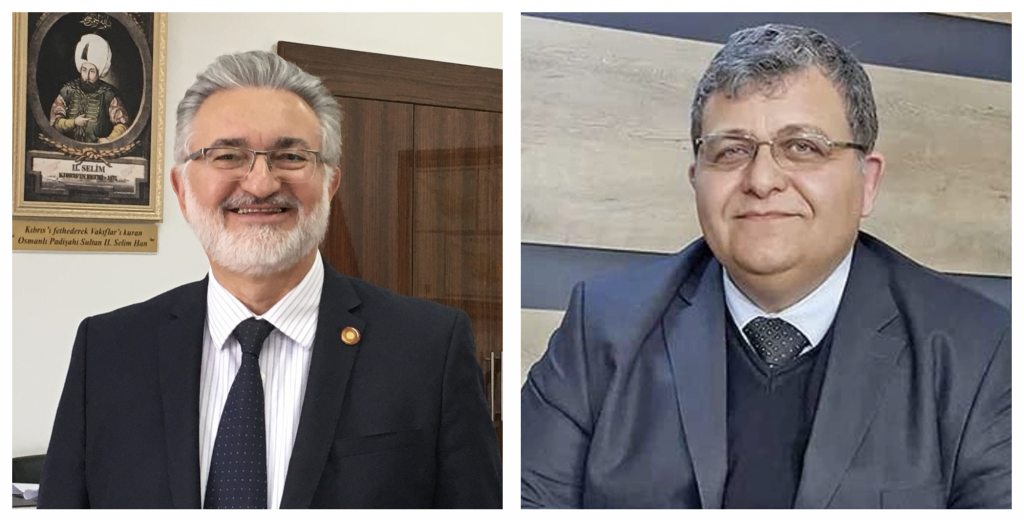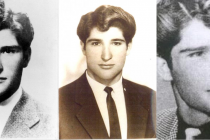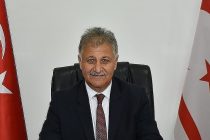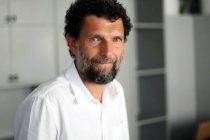Professor Ibrahim Benter’s term as the Director-General of Kıbrıs Vakıflar İdaresi has come to an end. The TRNC Council of Ministers called time on Benter’s decade in charge of the oldest Turkish Cypriot institute, naming Professor Mustafa Tümer (top right) as his replacement. The details were announced in the Official Gazette last week.
Kıbrıs Vakıflar İdaresi (Cyprus Islamic Foundations Administration), or Evkaf for short, has been transformed under Professor Benter’s leadership.
A heart and vascular medical specialist by profession, Prof. Benter left a highly paid lecturing job in Kuwait to take over Evkaf in 2013. In under a decade, he turned this ailing and largely irrelevant organisation that was barely able to raise 70,000 TL annually for charity, despite its considerable assets, into North Cyprus’ biggest and best funded body that now spends in excess of 70 million TL a year on a wide range of charitable causes benefiting Turkish Cypriots and others in Cyprus.
As Director-General of Evkaf, Prof Benter successfully waged multiple political and legal battles to regain control over assets belonging to one of the 2,200 trusts the body administers and to ensure proper rental income was being received for them.
A practising Muslim, Prof Benter re-established the core values of Evkaf, attracting new volunteer and philanthropic support, while raising the organisation’s profile in the TRNC.
Prof. Benter also instructed lawyers to protect Evkaf’s assets in the ghost town of Varosha / Maraş and more recently, on the Sovereign British Bases in Cyprus.
The 61-year-old Lefkoşa-born, American educated charity head had enjoyed the backing of President Erdoğan of Turkiye and was highly regarded by many Turkish Cypriots. However, non-religious activists in the TRNC resented the resurgence of such a strong, Islamically-rooted organisation, repeatedly trying to attack and discredit Prof. Benter, without much success.
Yet Benter also faced opposition from a variety of government ministers over the past 10 years as he sought to stamp out corruption and mismanagement of the vast real estate under Evkaf’s control, seeking to put these assets beyond the influence and control of politicians.
It’s not clear if this or another reason is behind the current coalition government’s decision to end Benter’s term in charge of Evkaf – there was no indication from either party prior to the announcement that a change was imminent.
One of Prof. Benter’s final activities as Evkaf head was this fundraising project to help the children of Gaza
The Cabinet decree on Prof. Benter being replaced by Prof. Mustafa Tümer was published in the TRNC Official Gazette (no. 263) on Thursday, 21 December, which simply stated:
“Prof. Dr. Ibrahim Benter, having been appointed Director-General of the Foundations Administration in accordance with the Council of Ministers decisions, K (ll) 1040-2013 and dated 22.5.2013, is now removed from this position and replaced by Mustafa Tümer as Director-General, in accordance with paragraph (1) of Article 16 of the Law No. 73/1991 on the Foundations Organization and Religious Affairs Department (Establishment, Duties and Working Principles).”
Although Evkaf is an independent organisation, its Director-General and board of directors are appointed by the Turkish Cypriot government, which has enabled political interference in the work of this historic and vital body.
About new Evkaf head Prof. Mustafa Tümer
Prof. Benter’s successor is Prof. Mustafa Tümer, who is five years his junior and also Lefkoşa-born.
Tümer studied Economics (B.Sc) at the Department of Economics, Eastern Mediterranean University (EMU), Famagusta, North Cyprus, where he also earned his MBA degree. He then studied for his doctorate at the Uludag University in Turkiye, which he completed in November 1999. Three months later he joined EMU’s teaching staff.
His lectures and research interests cover Small and Medium Size Enterprises, entrepreneurship, consumer behaviour, and service marketing. He also teaches Statistics and Data Analysis at Masters level, and Marketing Theory at PhD level.
Prof. Tümer has also published multiple academic papers in international peer review journals and presented his findings at international conferences in countries such as the UK, USA, Hungary, Ireland, Turkiye, and Sweden.
During his 23-year professional career at EMU, Prof. Tümer has held a variety of roles including Vice-Chair (2003-2010) and later Chair (2010 to present) of the Department of Business Administration. He was the director of the Management Research Centre (2008-2010), and also helped establish the Centre for Entrepreneurship and Innovation in 2011, where he serves as a director, carrying out over a dozen research projects for the TRNC Government and TRNC Chamber of Industry.
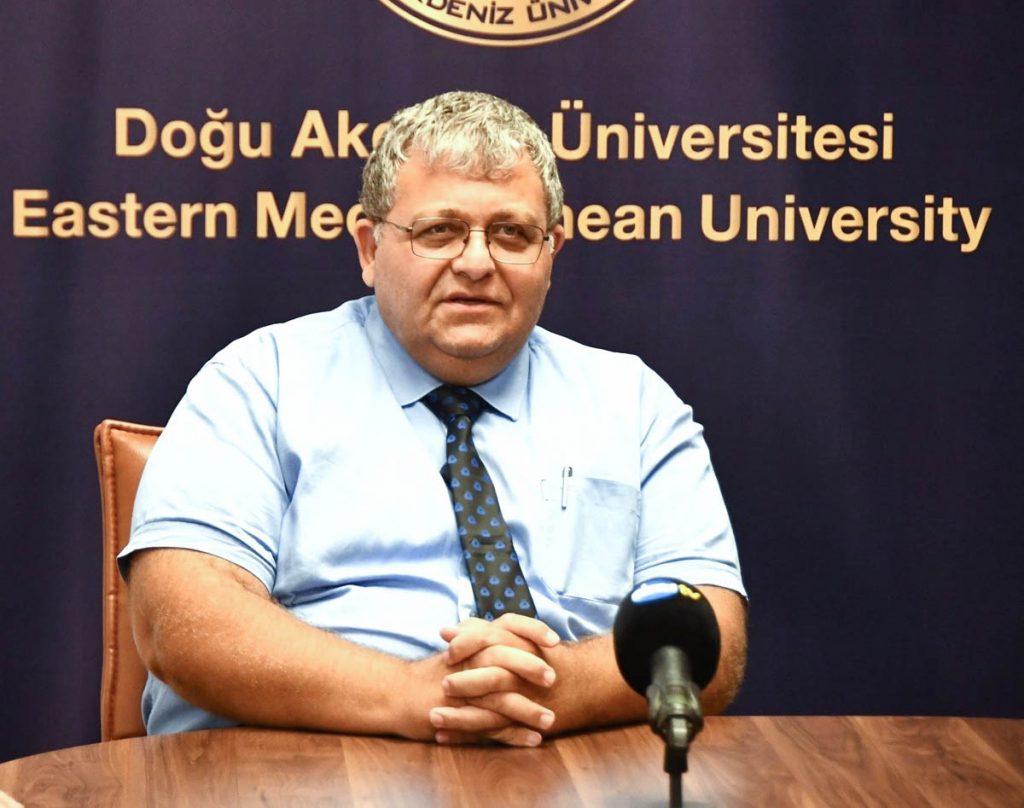
He was selected as a Fulbright scholar twice (in 2004 and 2011), which allowed him to attend and give lectures at George Washington University, MIT, Babson College, New Hampshire University, San Diego State University and California State University Pomona.
When EMU Rector Prof. Aykut Hoca and his senior team unexpectedly resigned in September, Prof. Tümer was selected to serve as Acting Rector until a permanent successor was found.
A popular and well-respected name in academia and wider society, Prof. Tümer has also served on the board of the Limassol Turkish Cooperative Bank and, in recent years, has also worked closely with Prof. Benter on several Evkaf projects.
About Evkaf
Established by the Sultan Selim’s firman [royal decree] in 1571, immediately after the Ottomans conquered Cyprus, Evkaf’s primary role is to administer charitable trusts that were formed in line with Islamic principles. This involves the rental income from assets, usually property, bequeathed to these trusts being used in perpetuity to do good deeds in line with the trust’s stated aims, whether this is general philanthropy or dedicated to a specific cause, such as to support education or provide healthcare, or help orphans, widows, or animals.
Evkaf administers some 2,200 charitable trusts similar to the way the UK’s Charities Commission functions, ensuring all the trusts operate in accordance with TRNC charity laws. In addition, Evkaf also runs some of the trusts, being directly responsible for their assets and charitable work.
Under British rule, Evkaf assets were illegally plundered, and the organisation’s wealth and assets significantly diminished. The theft occurred despite the British expressly agreeing to uphold the law protecting Evkaf property. Instead, it targeted the large real estate that had been bequeathed in perpetuity to trusts that Evkaf administered across the island of Cyprus and unlawfully transferred parcels of land to private owners or to the state.
This theft, meticulously documented in recent years, deprived Evkaf and its trusts of the financial income it required to carry out the charitable works it was mandated to do, which in turn undermined the wellbeing of Cypriot society.
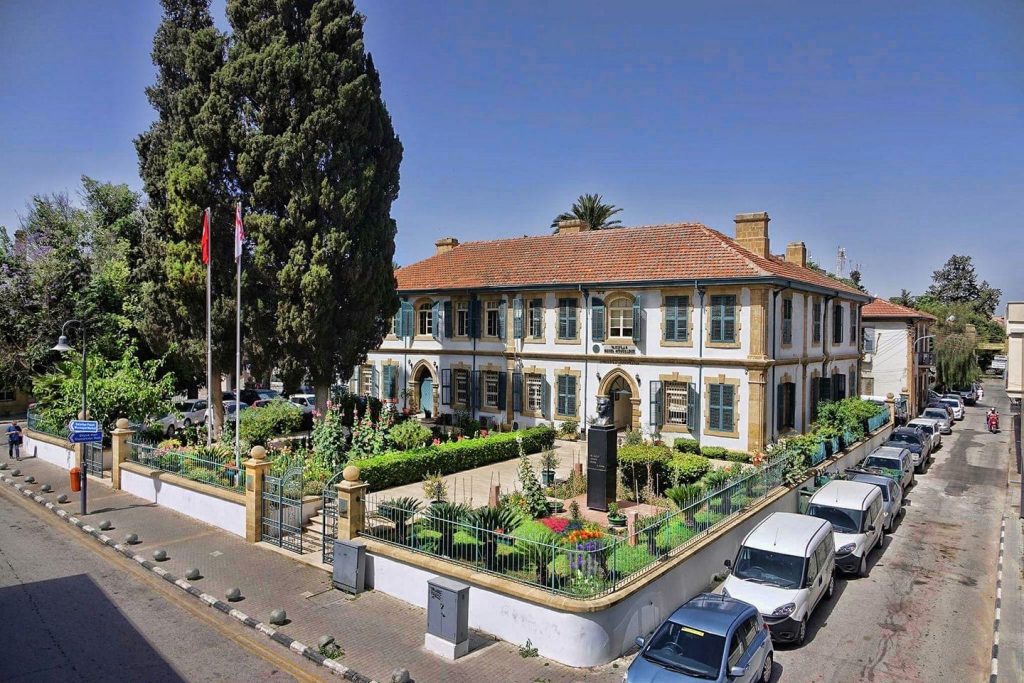
This has allowed Evkaf to help Turkish Cypriots and wider society in multiple ways, from providing welfare to those of limited financial means, to paying for the restoration of religious monuments and buildings including Apostolos Andreas Monastery, and also donating vital medical equipment to hospitals.
As part of its philanthropic remit, Evkaf has sponsored Turkish Cypriot athletes and the disabled basketball team, and financed the renovation of school classrooms and improved key facilities such as school libraries and science labs.
Evkaf’s real estate is also used to help craftsmen, farmers and other small businesses when they start out by providing them with affordable land and office space to rent.
Perhaps most significantly under Prof. Benter’s tenure was his efforts to foster a culture among Turkish Cypriots of doing acts of kindness in society, which is a fundamental part of Islam.
Evkaf’s social media pages pay testament to young people’s increased awareness and involvement in civil society initiatives in the TRNC. These vary from activities designed to help protect the environment to supporting Palestinians impacted by the Gaza War.


